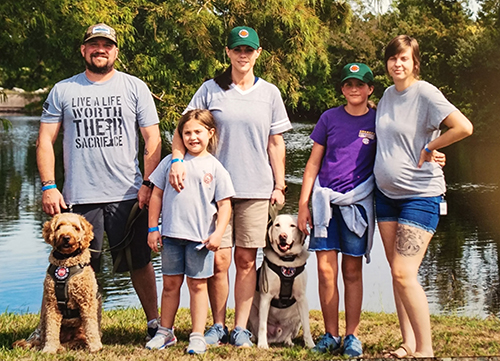
What Works and What Doesn’t When it Comes to Stopping Tobacco Use

Ready to learn more about living tobacco free?
Download a PDF of Living Tobacco Free: A Toolkit for Military and Veteran Family Caregivers today!
Get the toolkitWhat works?
It is important to remember that what works for one person will not always work for another. Each person’s journey towards leading a Tobacco-Free life is unique.
- Decide and select a firm date for stopping tobacco use. Perhaps make the date coincide with another meaningful event in your life such as an anniversary, child’s birthday, or around the holidays;
- Set your intention—end your tobacco use in honor or memory of someone. Perhaps a child, loved one, or even family pet! Alternatively, some of the Caregivers we surveyed indicated that just doing it for themselves was a strong, motivating factor;
- Before your stop date, be sure to wash all the clothes that you have previously smoked around;
- If you smoke in the home and/or your car, clean both before the day that you stop smoking. Dispose of tobacco and smoking devices including lighters, cigarettes, and pipes ahead of your stop date;
- If possible, make a dental appointment to have your teeth cleaned before your stop date;
- Talk to family, friends and the person you are caring for to let them know your plan to quit using tobacco. Inform them of any support you may anticipate needing from them—your request may even be for simple words of encouragement;
- Make a plan—whether you decide to use our ALA’s Freedom From Smoking online tool, medication, nicotine gum, or any other known method, write it down! Post it where you and others can see it and monitor your progress.This will help by creating accountability and harnessing the support of those who around you;
- Make your plan realistic and set personal goals as well as rewards for yourself;
- Conduct your own research—the references in this tool-kit are a great start. You will find that there are many mobile applications, websites, in-person and online programs, medicines and alternative methods that can help you significantly. Exploring what is feasible for you and what fits your lifestyle is a strong foundation to build change upon.
What doesn’t work?
We are not here to state the obvious—that smoking is bad for you is no longer a little-known fact. The decision to quit has to be a personal one. If the reasons aren’t directly applicable to your life, it may prove much harder to hold yourself accountable. We do not want to put you or the Veteran you care for in a defensive stance against ending tobacco use.
Military and Veteran Caregivers have indicated that the following did not work for them during their journey:
- For some, quitting cold turkey, nicotine patches, and medicine did NOT work. While others found that gradual reduction was not for them. Once again, this supports the notion that you have to identify what works best for you personally;
- Many Caregivers recognized judgment and criticism as tactics that did not encourage them to quit smoking;
- Being around others who smoke. Many Caregivers mentioned that their spouse’s continued use of tobacco creates a challenging environment. In some cases, the spouse was the Veteran or Service Member being cared for.
Download the Living Tobacco Free: A Toolkit for Military and Veteran Family Caregivers for more tips on what and what doesn't work when it comes to stopping tobacco use.
Learn how to manage your stress to avoid tobacco use.








 “Streaming is both accessible and not accessible,” Evans said. “The streaming part itself is accessible, in that it allows me to make my own schedule, and I can work it around my disabilities. However, the inaccessible part is the demand for content creators to constantly be networking, attending events and continuously pushing out content. I cannot attend events, and if I can they’re incredible stressful, so all my work networking has basically been done online, which thankfully is becoming a more acceptable side of content creation.”
“Streaming is both accessible and not accessible,” Evans said. “The streaming part itself is accessible, in that it allows me to make my own schedule, and I can work it around my disabilities. However, the inaccessible part is the demand for content creators to constantly be networking, attending events and continuously pushing out content. I cannot attend events, and if I can they’re incredible stressful, so all my work networking has basically been done online, which thankfully is becoming a more acceptable side of content creation.” “I must say over the years it has become less and less accessible for me,” Martínez said. “SMA (Spinal Muscular Atrophy) causes strength, endurance and mobility loss as time passes. I can’t use a physical keyboard as I used to, so it’s been years now with an on-screen keyboard. Voice dictation doesn’t work well for me due to my voice being inconsistent, not to mention my accent. In English it can go from totally wrong to acceptable. In Spanish, my native language, it works better.”
“I must say over the years it has become less and less accessible for me,” Martínez said. “SMA (Spinal Muscular Atrophy) causes strength, endurance and mobility loss as time passes. I can’t use a physical keyboard as I used to, so it’s been years now with an on-screen keyboard. Voice dictation doesn’t work well for me due to my voice being inconsistent, not to mention my accent. In English it can go from totally wrong to acceptable. In Spanish, my native language, it works better.” “What drew me to consulting was the opportunity to leverage my unique perspective as both an able-bodied and disabled gamer to improve the gaming experience for others,” Lane said. “I can share the frustrations I’ve faced as a disabled gamer and use that knowledge to advocate for better accessibility features. Companies and studios that I work with go the extra mile to make sure I have everything I need to succeed.”
“What drew me to consulting was the opportunity to leverage my unique perspective as both an able-bodied and disabled gamer to improve the gaming experience for others,” Lane said. “I can share the frustrations I’ve faced as a disabled gamer and use that knowledge to advocate for better accessibility features. Companies and studios that I work with go the extra mile to make sure I have everything I need to succeed.”



Connect with us on social media